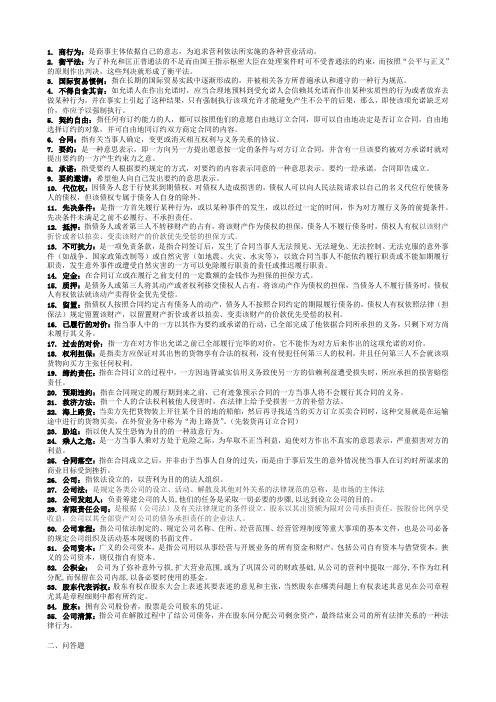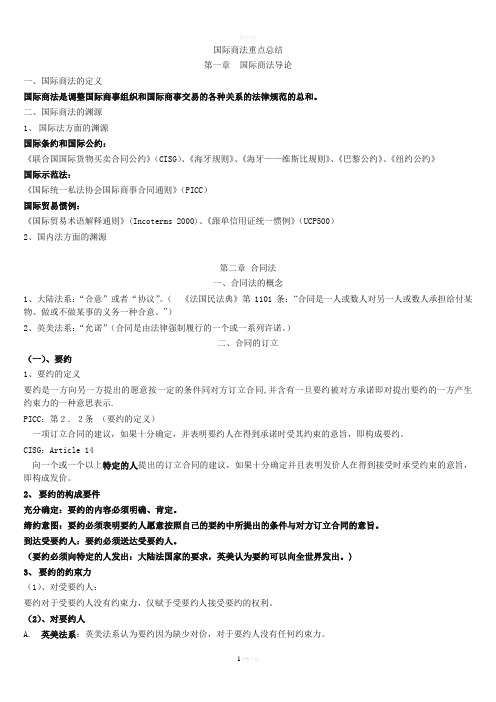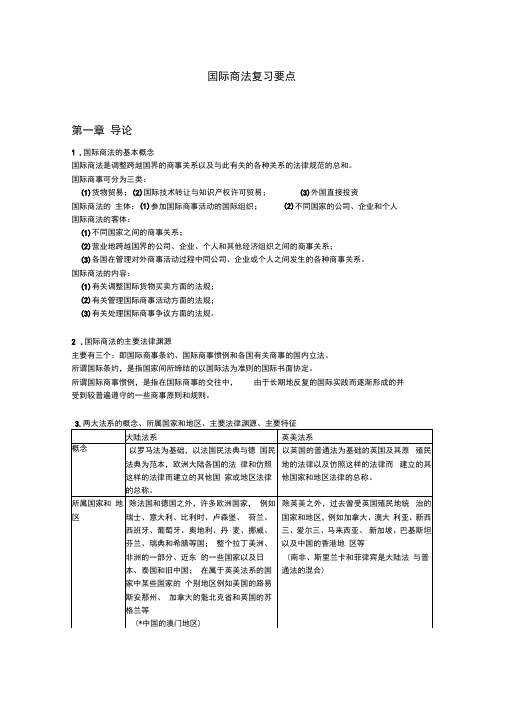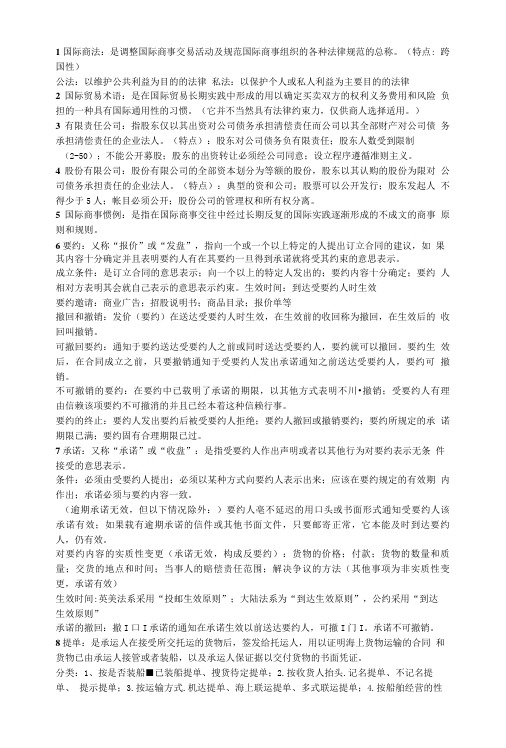国际商法复习重点整理
国际商法重点

1. 商行为:是商事主体依据自己的意志,为追求营利依法所实施的各种营业活动。
2. 衡平法:为了补充和匡正普通法的不足而由国王指示枢密大臣在处理案件时可不受普通法的约束,而按照“公平与正义”的原则作出判决,这些判决就形成了衡平法。
3. 国际贸易惯例:指在长期的国际贸易实践中逐渐形成的,并被相关各方所普遍承认和遵守的一种行为规范。
4. 不得自食其言:如允诺人在作出允诺时,应当合理地预料到受允诺人会信赖其允诺而作出某种实质性的行为或者放弃去做某种行为,并在事实上引起了这种结果,只有强制执行该项允许才能避免产生不公平的后果,那么,即使该项允诺缺乏对价,亦应予以强制执行。
5. 契约自由:指任何有订约能力的人,都可以按照他们的意愿自由地订立合同,即可以自由地决定是否订立合同,自由地选择订约的对象,并可自由地同订约双方商定合同的内容。
6. 合同:指有关当事人确定,变更或消灭相互权利与义务关系的协议。
7. 要约:是一种意思表示,即一方向另一方提出愿意按一定的条件与对方订立合同,并含有一旦该要约被对方承诺时就对提出要约的一方产生约束力之意。
8. 承诺:指受要约人根据要约规定的方式,对要约的内容表示同意的一种意思表示。
要约一经承诺,合同即告成立。
9. 要约邀请:希望他人向自己发出要约的意思表示。
10. 代位权:因债务人怠于行使其到期债权,对债权人造成损害的,债权人可以向人民法院请求以自己的名义代位行使债务人的债权,但该债权专属于债务人自身的除外。
11. 先决条件:是指一方首先履行某种行为,或以某种事件的发生,或以经过一定的时间,作为对方履行义务的前提条件。
先决条件未满足之前不必履行,不承担责任。
12. 抵押:指债务人或者第三人不转移财产的占有,将该财产作为债权的担保,债务人不履行债务时,债权人有权以该财产折价或者以拍卖、变卖该财产的价款优先受偿的担保方式。
13. 不可抗力:是一项免责条款,是指合同签订后,发生了合同当事人无法预见、无法避免、无法控制、无法克服的意外事件(如战争、国家政策改制等)或自然灾害(如地震、火灾、水灾等),以致合同当事人不能依约履行职责或不能如期履行职责,发生意外事件或遭受自然灾害的一方可以免除履行职责的责任或推迟履行职责。
国际商法重点总结

国际商法重点总结第一章国际商法导论一、国际商法的定义国际商法是调整国际商事组织和国际商事交易的各种关系的法律规范的总和。
二、国际商法的渊源1、国际法方面的渊源国际条约和国际公约:《联合国国际货物买卖合同公约》(CISG)、《海牙规则》、《海牙——维斯比规则》、《巴黎公约》、《纽约公约》国际示范法:《国际统一私法协会国际商事合同通则》(PICC)国际贸易惯例:《国际贸易术语解释通则》(Incoterms 2000)、《跟单信用证统一惯例》(UCP500)2、国内法方面的渊源第二章合同法一、合同法的概念1、大陆法系:“合意”或者“协议”。
(《法国民法典》第1101条:“合同是一人或数人对另一人或数人承担给付某物、做或不做某事的义务一种合意。
”)2、英美法系:“允诺”(合同是由法律强制履行的一个或一系列许诺。
)二、合同的订立(一)、要约1、要约的定义要约是一方向另一方提出的愿意按一定的条件同对方订立合同,并含有一旦要约被对方承诺即对提出要约的一方产生约束力的一种意思表示.PICC:第2.2条(要约的定义)一项订立合同的建议,如果十分确定,并表明要约人在得到承诺时受其约束的意旨,即构成要约。
CISG:Article 14向一个或一个以上特定的人提出的订立合同的建议,如果十分确定并且表明发价人在得到接受时承受约束的意旨,即构成发价。
2、要约的构成要件充分确定:要约的内容必须明确、肯定。
缔约意图:要约必须表明要约人愿意按照自己的要约中所提出的条件与对方订立合同的意旨。
到达受要约人:要约必须送达受要约人。
(要约必须向特定的人发出:大陆法国家的要求,英美认为要约可以向全世界发出。
)3、要约的约束力(1)、对受要约人:要约对于受要约人没有约束力,仅赋予受要约人接受要约的权利。
(2)、对要约人A.英美法系:英美法系认为要约因为缺少对价,对于要约人没有任何约束力。
“对价理论”:一个人所做出的允诺在法律上有无约束力,取决于对方有无给付对价。
国际商法复习要点

国际商法复习要点第一章导论1.国际商法的基本概念国际商法是调整跨越国界的商事关系以及与此有关的各种关系的法律规范的总和。
国际商事可分为三类:(1)货物贸易;(2)国际技术转让与知识产权许可贸易;(3)外国直接投资国际商法的主体:(1)参加国际商事活动的国际组织;(2)不同国家的公司、企业和个人国际商法的客体:(1)不同国家之间的商事关系;(2)营业地跨越国界的公司、企业、个人和其他经济组织之间的商事关系;(3)各国在管理对外商事活动过程中同公司、企业或个人之间发生的各种商事关系。
国际商法的内容:(1)有关调整国际货物买卖方面的法规;(2)有关管理国际商事活动方面的法规;(3)有关处理国际商事争议方面的法规。
2.国际商法的主要法律渊源主要有三个:即国际商事条约、国际商事惯例和各国有关商事的国内立法。
所谓国际条约,是指国家间所缔结的以国际法为准则的国际书面协定。
所谓国际商事惯例,是指在国际商事的交往中,由于长期地反复的国际实践而逐渐形成的并受到较普遍遵守的一些商事原则和规则。
第二章合同法(重点)1.要约的概念及有效要件要约是指一方当事人以缔结合同为目的向一个或一个以上特定的人发出,内容十分确定,且要约人表明愿意承受要约约束的意思表示。
一项有效的要约须具备下述条件:(1)要约人必须清楚表明愿意按照要约的内容订立合同的意思。
(2)要约必须是由要约人向特定的受要约人发出。
(3)要约的内容需十分确定。
(4)要约只有传达到受要约人处方为有效。
2.要约与要约邀请的区别3.要约的约束力(撤回与撤销)要约的约束力,是指要约一旦生效后,对双方当事人的强制力。
(1)要约对受要约人的约束力。
一般来讲,要约对受要约人是没有约束力的。
(德国和日本)(2)要约对要约人的约束力。
①要约的撤回是指要约人在发出要约后,而在要约尚未生效前,要约人将要约取消,阻止其生效。
各国法律的规定与《销售合同公约》的规定基本一致,即一项要约,即使是不可撤销的,也可以撤回,但撤回要约的通知必须于要约到达受要约人之前或与该要约同时送达受要约人。
国际商法复习重点整理

国际商法复习重点整理国际商法复习重点整理考试题型:选择题10*2=20判断题10*1=10名词解释5*5=25简答题3*6=18案例分析6*2=12论述151.Legal system(两种法律体系的区别和特点)Civil law system:1)statutory law,based on a comprehensive code2)France,Germany,Switzerland etc3)emphasize the importance of written law4)case has no legal validityCommon law system:1)derived from custom,usage and court decision or court -established law2)England,USA,Canada etc3)evolves through case precedent,binding the later2.Incoterms2000(the International Rules for the Interpretation of Trade Te rms revised in2000by International Chamber of Commerce)UCP600(the Uniform Customs and Practice for Commercial Documentary Credits revised in2007by International Chamber of Commerce)(了结)3.Legal Characteristics of corporation:(1)Ownership of Property(2)Independent legal personality/status(3)Centralized management(4)Limited Liability:shareholders share limited liability to the extent of capital contribution4.Classification of Corporation(比较和区别这两种公司)(1)Corporation with Limited Liabilitya.the number of shareholders confined by law and regulationb.stocks not issued and could not be freely transferred(Transfer of stocks be strictly restricted.Under the same condition,othe r shareholders ownc.priority in buying this stock.Thus,the relationship between shareholder s is much stable)shareholders assume limited liability to corporationd.evident characteristic of personal closure(2)Corporation Limited by Sharesa.the number of shareholders not limited,usually multitudinousb.the total capital divided into equal stockc.stock be publicly issued and could be freely transferred according lawd.the right of ownership and that of operation be separatee.the scale is much bigger than that of corporation with limited liability5.(比较子公司和分公司区别)Subsidiary:(1)legal person;(2)independently assume civil responsibility,although be controlled somewh at by parent corporation.Branch:(1)with no legal person status;(2)its civil responsibility be assumed by the home corporation(最主要的区别:子公司是独立的法人,分公司不是独立法人)6.Merger:()比较吸收合并和新设合并的区别(1)merger by amalgamation(吸收合并)When a corporation has another corporation amalgamated with it,it is merger by amalgamation,and the amalgamatedcorporation shall be dissolved(2)merger by new establishment(新设合并)When two or more corporations merge to establish a new corporation,it is me rger for new establishment,and all parties being merged shall be dissolved(when corporations merge,the claims and debts of all the parties to the me rger shall be succeeded to by the corporation that continues to exist after the merger or by the newly established corporation.)7.Applicability of CISG(1)The contract is for the commercial sale of goods;(2)It is between parties whose places of business are in different States (nationality or citizenship of individuals is not a determining factor);8.Reservation(中国对CISG做的两项保留)a.the reservation towards the applicable scope of CISG:China agrees that CISG shall be limitedly applied to a contract of sale ente red into by and between the parties whose business premises are located in t he contracting States of CISG,don’t agree to expand the applicable scope o f CISG in accordance with the conflict rules;b.the reservation towards the form of a contract.9.Structure and Scope of PICCEach article is accompanied by(1)comments and where appropriate by(2)factu al illustrations intended to explain the reasons for the black letter rule a nd the different ways in which it may operate in practice.10.Contractual Capacity(1)Common Lawthere are three classes of persons who are not considered tohave sufficient capacity to be bound by the contract:a.Minors(typically under18)b.Mentally Impaired or Incompetent Personsc.Drunk Persons(2)ChinaThere are three classes of capacity:a.Full capacity(age18or above,adult)b.Limited capacity(a minor aged10or above;a mentally ill person who is unable to fully account for his own conduct)c.No capacity(a minor under the age10;a mentally ill person who is unabl e to account for his own conduct)(判断:minor都是限制行为人。
国际商法复习重点.doc

1国际商法:是调整国际商事交易活动及规范国际商事组织的各种法律规范的总称。
(特点: 跨国性)公法:以维护公共利益为目的的法律私法:以保护个人或私人利益为主要目的的法律2国际贸易术语:是在国际贸易长期实践中形成的用以确定买卖双方的权利义务费用和风险负担的一种具有国际通用性的习惯。
(它并不当然具有法律约束力,仅供商人选择适用。
)3有限责任公司:指股东仅以其出资对公司债务承担清偿责任而公司以其全部财产对公司债务承担清偿责任的企业法人。
(特点):股东对公司债务负有限责任;股东人数受到限制(2-50);不能公开募股;股东的出资转让必须经公司同意;设立程序遵循准则主义。
4股份有限公司:股份有限公司的全部资本划分为等额的股份,股东以其认购的股份为限对公司债务承担责任的企业法人。
(特点):典型的资和公司;股票可以公开发行;股东发起人不得少于5人;帐目必须公开;股份公司的管理权和所有权分离。
5国际商事惯例:是指在国际商事交往中经过长期反复的国际实践逐渐形成的不成文的商事原则和规则。
6要约:乂称“报价”或“发盘”,指向一个或一个以上特定的人提出订立合同的建议,如果其内容十分确定并且表明要约人有在其要约一旦得到承诺就将受其约束的意思表示。
成立条件:是订立合同的意思表示;向一个以上的特定人发出的;要约内容十分确定;要约人相对方表明其会就自己表示的意思表示约束。
生效时间:到达受要约人时生效要约邀请:商业广告;招股说明书;商品目录;报价单等撤回和撤销:发价(要约)在送达受要约人时生效,在生效前的收回称为撤回,在生效后的收回叫撤销。
可撤回要约:通知于要约送达受要约人之前或同时送达受要约人,要约就可以撤回。
要约生效后,在合同成立之前,只要撤销通知于受要约人发出承诺通知之前送达受要约人,要约可撤销。
不可撤销的要约:在要约中已载明了承诺的期限,以其他方式表明不川•撤销;受要约人有理由信赖该项要约不可撤消的并且已经本着这种信赖行事。
国际商法重点

第一章1.国际商法:是调整国际商事贸易与商事组织各种关系的法律规范的总和。
2.商法包括商业法3.商法与民法的联系与区别:联系:民商分立,相互独立;或者是民商合一,民法为基本法,商法则纳入民法典中,作为民法的特别法。
区别:1)从法律关系看,商事关系完全是财产关系,均属于有偿关系;而民事法律关系既有财产关系,也有人身关系,在财产关系中既有有偿的也有无偿的。
2)从法律制约程度看,商法对商事行为的要求具有相当的灵活性,形式也比较多样化,完全取决于市场运行的客观要求。
而民法对民事法律行为的要求则比较严格,方式也比较单一,特别是在物权法领域。
3)从归责原则看,商法的归责原则在很多情况下均承认无过错也应承担责任;在民事责任中,则仍以过错责任原则为主,对无过错责任与过错推定等均有许多限制。
4)从规范形式看,商事习惯规范在形成和发展中具有重要的作用,而民法虽然也有习惯法与成文法的区别,但从现实情况看,成文法的地位已经远远超过习惯法。
5)从国际性看,商法的国别差异越来越小,国际法已经成为商法的重要组成部分;民法则具有比较强的传统型、民族性与区域性。
4.国际商法与国际贸易法的联系与区别:国际法语国际贸易法既有相对的独立性,又有相互补充;既自成体系,又有密切的联系。
联系:1)它们的渊源相同,都源于国际公约于国际贸易惯例2)你中有我,我中有你,具有互补性。
区别:1)概念不同,国际商法是调整国际商事交易与商事组织的各种关系的法律规范的总和;国际贸易法则是调整各国之间的贸易关系以及与贸易有关的其他各种关系的法律规范的总和。
2)所属范畴不同,国际商法基本属于私法的范畴,而贸易既包括私法的内容,也包含公法的内容。
3)国际贸易法必须以国内商法为补充,因为现有的有关国际贸易的公约于惯例还没有被参加国际贸易活动的所有国家或地区普遍承认和采用。
4)包含内容不同,如国际贸易法中的“对外贸易管制措施”,其中包括对外贸易管制、贸易条约与协定以及关税与贸易总协定等,这些都属于公法的内容,是国际法所没有的。
国际商法期末复习重点
国际商法期末复习重点1.两大法系的来源和主要特点P101)大陆法系:因其源自于欧洲大陆而得名,由于大陆法系的历史渊源来自于古代罗马法,因此也称罗马法系。
特点:a.表现形式主要是成文法,尤其重视法典化。
b.从整体上将全部法律区分为公法与私法两大部分。
c.在法律的历史渊源方面几乎完全继承罗马法。
d.与成文法相吻合,大陆法系通行演绎逻辑大法律推理方式e.有种实体轻程序的倾向。
2) 英美法系:指的是英国自中世纪以来形成的,以普通法为核心,以衡平法为补充而发展起来并深受其影响的,包括其他国家法律在内的一系列法律制度的总称。
特点:a.英美法系的法律渊源表现为判例法。
b.没有公私法的划分c.法官在适用法律上往往奉行归纳逻辑的推理方式。
d.诉讼程序方面,英美法系法官消极性较强,诉讼进程由当事人主导,当事人的对抗浓郁。
2.案例分析P13中国甲公司(卖方)与英国乙公司(买方)签订了一份买卖合同,使用了“FOB上海”贸易术语。
现在双方就履行合同问题发生争议而诉诸法院。
家公司认为应当适用中国合同法解决争议,因为合同的签订在上;乙公司则主张适用英语的法律,因为受诉法院在英国。
问:(1)双方所签订的合同具有“国际性”吗?为什么?(2)假如你是审理本案的法官,你认为对于的双方的争议该适用什么法律?为什么?答:(1)中国甲公司与英国乙公司所签订的合同属于国际商事合同,具有“国际性”。
判断合同是否具有国际性,就其标准而言,各个国家的规定是不一样的。
主要有国籍说、住所地说和综合说等。
我国最高人民法院《关于贯彻<民法通则>若干问题的意见》第178条规定“饭民事关系的一方或者双方当事人是外国人、无国籍人、外国法人的;民事关系的标的物在外国领域内的;产生、变更或者消灭民事权利的义务关系的法律事实发生在外国的,均为涉外民事关系。
”可见我国司法实践中采取的是综合说的标准。
本案中合同的当事人一方为英国公司,另一方为中国公司,完全符合上述最高人民法院的规定,属于涉外商事合同,因此,双方所订立的合同具有国际性。
国际商法复习重点
国际商法:调整国际商事组织内部各种关系及商事组织之间从事国际商事交易时所产生的各种关系的法律规范的总称。
大陆法系与英美法系的区别1、法律渊源不同大陆:其法律以成文法即制定法的形式存在,不包括司法判例。
英美:既包括制定法,也包括判例,且判例构成的判例法在整个法律体系中占着主体地位。
2、法律结构不同大陆:以法典为法律体系的主干。
英美:以单行法为法律体系的主干3、法律分类不同大陆:将法律分为公法和私法两大类。
英美:将法律分为“普通法”和“衡平法”两大类。
4、法官权限不同大陆:只能援用而不能创造法律。
英美:不仅运用法律,也在一定范围内创造法律。
5、诉讼程序不同大陆:以法官为重心,庭审中采用提问制。
普通:当事人主义(对抗制),法官只是居中裁判。
6、思维方式不同大陆:“一般到个别”的演绎推理。
英美:“个别到一般”的归纳原则。
民法和商法的关系1.都属于私法范畴2.一般法和特别法的关系民法是一般法,商法是特别法。
在商事关系的调整中,民法的一般性规定都适用于商事关系。
商法所调整的商事关系是一种比较纯粹的的财产关系。
3.营利性是商法最主要特征,一般的民事行为不以营利动机为必然要素4. 商法的效力优先于民法依照特别法优先于普通法的原则,商事关系应首先适用商法的相关规定。
商事组织:能够以自己名义从事盈利性活动,并且具有一定规模的经济组织。
国际商事代理:代理人为取得佣金,依被代理人的授权,为被代理人的利益与第三人进行商业行为,由此在具有国际因素的被代理人、代理人及第三人之间产生权利义务关系的法律制度。
代理权的产生原因:大陆法系下:1、意定代理2、法定代理英美法系下:1、实际授权—分为明示授权和默示授权2、表见授权3、必要的授权:紧急处分的代理被代理人对第三人的义务有哪些?1. 被代理人按照合同规定履行对第三人的义务大陆法系:直接代理被代理人直接对第三人负责间接代理是代理人与第三人的合同,被代理人原则上不能直接对第三人主张权利。
国际商法考试复习知识点
国际商法考试复习知识点
一、国际商业的商业实施程序
1、国际商法定义:国际商法是一种独立而普遍的诉讼和仲裁程序,用于处理国际商
业交易中产生的纠纷。
2、国际商业实施程序:国际商业实施程序要求双方通过合同解决争端,社会规范只
是优先级低的补充性路径。
它主要包括以下几个步骤:
(1)诉讼:当一方未遵守双方约定的条款时,另一方可以采取诉讼行动,在被诉方
住所国法院或申诉权利国知识产权法院有关讼论地,可以提起诉讼要求损失赔偿。
(2)和解:双方可以为解决争端达成和解,以避免拖延期间加剧纠纷。
和解也可以
在纠纷问题没有完全解决之前继续。
(3)仲裁:双方可以通过仲裁机构以友好的方式达成协议,解决因国际商业双方之
间的纠纷而产生的纠纷,而不必通过诉讼解决。
(4)调解:双方也可以就纠纷问题寻求调解,由一名或多个调解人协助双方谈判。
二、国际商交易的重要性
1、国际商业交易的重要性:国际商交易是当今国际贸易的基础,也是多个国家之间
友好合作互利共赢发展的重要形式,为国内外企业带来了许多利益和机会。
2、国际商交易服务支持:国际商业交易对社会发展有着重要的作用,国家为此提供
各种服务和支持。
比如中国政府出台了外贸出口保险和外汇支付机制,方便外贸贸易活动。
3、国际商业规则的重要性:国际商业的发展需要有共同的规则和标准来保护双方免
受损害,因此有很重要的意义,国际商法可以有效地维护双方权利。
4、国际商业安全须知:参与国际商业交易,应该了解相关的法律法规和规章制度,
掌握商业风险预防有效控制的方法,加强社会责任意识,避免损失和降低不必要的风险。
国际商法复习要点
国际商法的概念:是指调整国际商事组织和国际商事交易活动的各种关系的法律规范的总和。
特征:1、国际商法调整的社会关系是一种具有国际因素的关系。
2、国际商法调整的社会关系是一种商事关系,不限于合同关系。
但是婚姻家庭、继承、收养等民事关系不包括在内。
3、国际商法是私法。
4、国际商法是统一实体规范。
国际商事惯例(usage),是指从事国际商事交易的商人们在商业实践中所形成的为交易当事人所承认并惯常遵守的不成文规则或程序。
大陆法系和英美法系代表国家和地区:法国、德国、日本、英格兰等| 英国、美国、加拿大等特点(1)法律的成文化,强调法典的编纂。
(1)在法律渊源上以判例法为主。
(2)公法和私法是大陆法系对法律最基本的划分。
(2)普通法和衡平法是法律的基本分类。
(3)法律渊源以成文法为主,判例原则上不是法律的渊源。
(3)重视程序法和程序正义。
(4)法院组织层级基本相同,除普通法院外还有专门法院。
(4)法院体系比较复杂(尤其是英国)。
要约:一项订立合同的建议,如果十分确定,并表明要约人在得到承诺时受其约束的意旨,即构成要约有效要约必须具备的条件:1.要约的内容必须明确、肯定(名称、数量、价格) 2.要约必须表明要约人愿意按自己的要约中所提出的条件与对方订立合同的意旨3.要约必须送达要约有下列情形之一者不能撤销:1.邀约写明承诺的期限或其他方式表明要约不可撤销2.受要约人有理由信赖该项要约是不可撤销的,并以本着对该项要约的信赖行事。
要约终止:1.要约人撤回或撤销要约失效2.因期间已过而失效3.因拒绝要约或者反要约而失效4.因法律原因失效承诺:指受要约人在要约有效期内按照要约所规定的方式对要约的内容表示接受的一种意思表示。
要约一经承诺合同成立。
有效承诺必须具备条件:1.承诺主体必须是受要约人或者其授权人的代理人2.必须在要约确定的有效期内作出3.承诺内容须与要约内容一致4.承诺的传达方式须符合要约所提出的要求国际商事合同通则:性质:非法律方法统一法律功能:1.作为示范法2.作为国际商事合同的准据法(1)当事人同意合同受通则管辖时(2)当事人同意合同受一般法律原则管辖时(3)当事人没有选择合同的适用法律时3.作为解释或补充国际统一法律文件和国内法工具Incoterms 2000通则的内容与特征。
- 1、下载文档前请自行甄别文档内容的完整性,平台不提供额外的编辑、内容补充、找答案等附加服务。
- 2、"仅部分预览"的文档,不可在线预览部分如存在完整性等问题,可反馈申请退款(可完整预览的文档不适用该条件!)。
- 3、如文档侵犯您的权益,请联系客服反馈,我们会尽快为您处理(人工客服工作时间:9:00-18:30)。
国际商法复习重点整理考试题型:选择题10*2=20判断题10*1=10名词解释5*5=25简答题3*6=18案例分析6*2=12论述151. Legal system (两种法律体系的区别和特点)Civil law system: 1) statutory law, based on a prehensive code2) France, Germany, Switzerland etc3) emphasize the importance of written law4) case has no legal validitymon law system: 1) derived from custom, usage and court decision or court-established law2) England, USA, Canada etc3) evolves through case precedent, binding the later2.Incoterms 2000 (the International Rules for the Interpretation of Trade Terms revised i n 2000 by International Chamber of merce)UCP600 (the Uniform Customs and Practice for mercial Documentary Credits revised in 2 007 by International Chamber of merce)(了结)3. Legal Characteristics of corporation:(1)Ownership of Property(2)Independent legal personality/status(3)Centralized management(4)Limited Liability: shareholders share limited liability to the extent of capital contributi on4. Classification of Corporation (比较和区别这两种公司)(1)Corporation with Limited Liabilitya. the number of shareholders confined by law and regulationb. stocks not issued and could not be freely transferred(Transfer of stocks be strictly restricted. Under the same condition, other shareholders ownc. priority in buying this stock. Thus, the relationship between shareholders is much stab le) shareholders assume limited liability to corporationd. evident characteristic of personal closure(2)Corporation Limited by Sharesa. the number of shareholders not limited, usually multitudinousb. the total capital divided into equal stockc. stock be publicly issued and could be freely transferred according lawd. the right of ownership and that of operation be separatee. the scale is much bigger than that of corporation with limited liability5. (比较子公司和分公司区别)Subsidiary: (1) legal person;(2) independently assume civil responsibility, although be controlled somewhat by parent corporation.Branch: (1)with no legal person status;(2) its civil responsibility be assumed by the home corporation(最主要的区别:子公司是独立的法人,分公司不是独立法人)6.Merger:()比较吸收合并和新设合并的区别(1)merger by amalgamation(吸收合并)When a corporation has another corporation amalgamated with it, it is merger by amalga mation, and the amalgamated corporation shall be dissolved(2)merger by new establishment(新设合并)When two or more corporations merge to establish a new corporation, it is merger for new establishment, and all parties being merged shall be dissolved(when corporations merge, the claims and debts of all the parties to the merger shall be succeeded to by the corporation that continues to exist after the merger or by the n ewly established corporation.)7.Applicability of CISG(1)The contract is for the mercial sale of goods;(2)It is between parties whose places of business are in different States (nationality or citizenship of individuals is not a determining factor);8.Reservation(中国对CISG做的两项保留)a. the reservation towards the applicable scope of CISG:China agrees that CISG shall be limitedly applied to a contract of sale entered into by a nd between the parties whose business premises are located in the contracting States of CISG, don’t agree to expand the applicable scope of CISG in accordance with the con flict rules;b. the reservation towards the form of a contract.9. Structure and Scope of PICCEach article is acpanied by (1)ments and where appropriate by (2)factual illustrations inte nded to explain the reasons for the black letter rule and the different ways in which it may operate in practice.10.Contractual Capacity(1)mon Lawthere are three classes of persons who are not considered to have sufficient capacity to be bound by the contract:a. Minors (typically under 18)b. Mentally Impaired or Inpetent Personsc. Drunk Persons(2) ChinaThere are three classes of capacity:a. Full capacity (age 18 or above, adult)b. Limited capacity (a minor aged 10 or above; a mentally ill person who is unable to f ully account for his own conduct)c. No capacity (a minor under the age 10; a mentally ill person who is unable to accou nt for his own conduct)(判断:minor 都是限制行为人。
错)11. OfferAn Offer is a statement by one party to another indicating an intention to enter into a c ontract on specified terms.China Contract Lawdefine that an offer is an intent indication showing the desire to enter into a contract with others12. Withdrawal and Revocation of Offer(区分撤消和撤回)Before an offer bees effective, the offeror can withdraw the offer; After an offer bees effe ctive, the offeror can revoke the offer.13.CISG和我国合同法的对比(不可撤消情形)CISGa. if it indicates, whether by stating a fixed time for acceptance or otherwise that it is ir revocable; orb. if it was reasonable for the offeree to rely on the offer as being irrevocable and the offeree has acted in reliance on the offer.China Contract Lawa) the offeror has specified a time limit for the acceptance or has explicitly indicated in any other manner the irrevocability of the offer; b) there are grounds for the offeree to maintain the irrevocability of the offer and the offeree has made preparations for the fulf illment of the contract.14.Requirements of Acceptancea. An acceptance must be made by the offeree;b. An acceptance must be municated to the offeror or his agent;c. An acceptance must be made within the period of validity (late acceptance is a counte roffer)d. An acceptance must match the terms of the offer exactly and unequivocally15. ConsiderationConsideration is one of the three elements of contract formation in mon law. It is some benefit received by a party who gives a promise or performs an act, or some detrimen t suffered by a party who receives a promise. In another word, consideration is what is actually given or accepted in return for a promise16.了解哪种法律使用哪种主义a. Under the mon law system, a contract is formed when the acceptance is dispatched b y the offeree. The time of dispatch is the time the letter is put into the hands of the p ostal authorities, which is known as “Mail-box rule”.(投邮主义)b. Under most civil law states, the Receipt theory is used。
